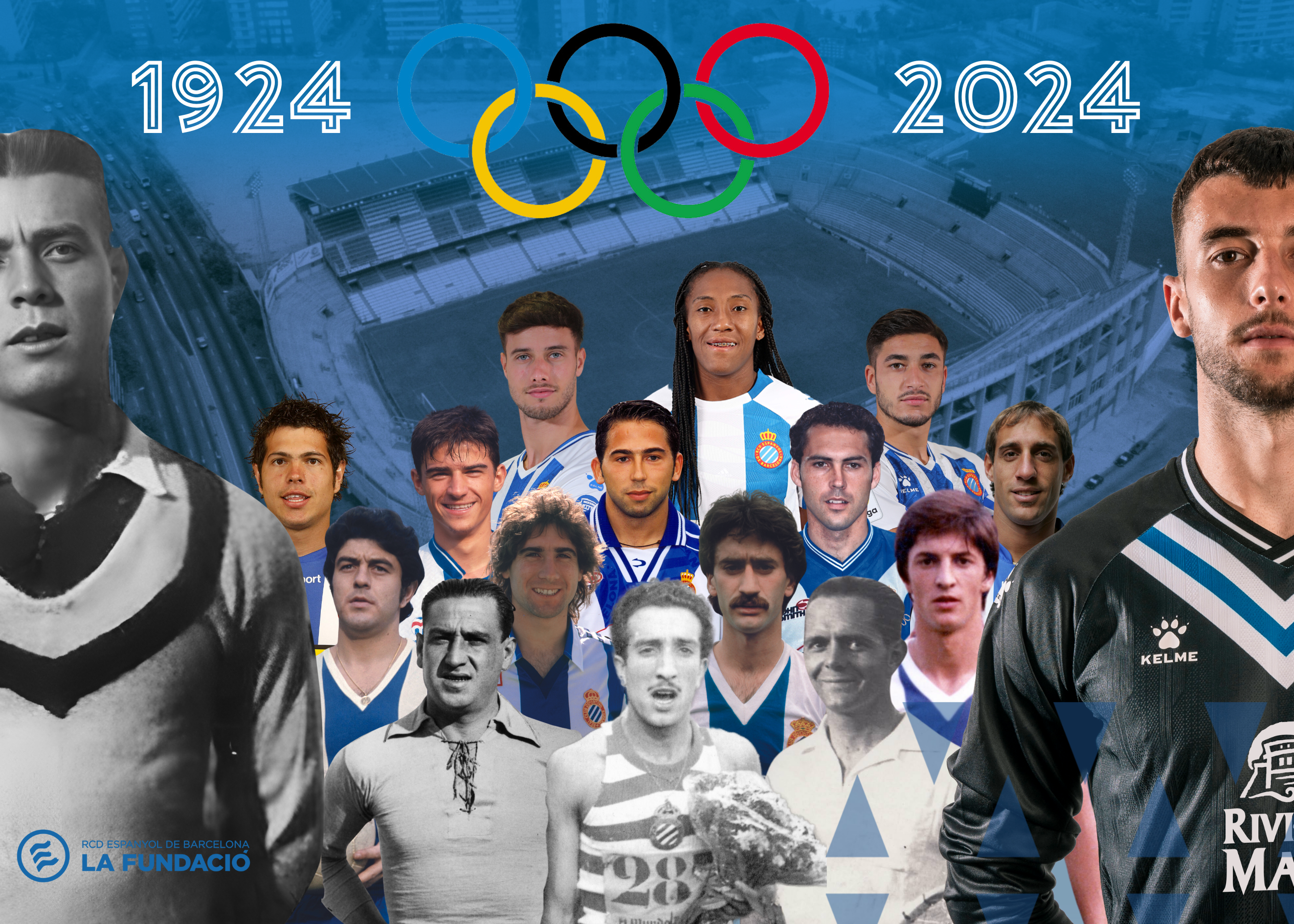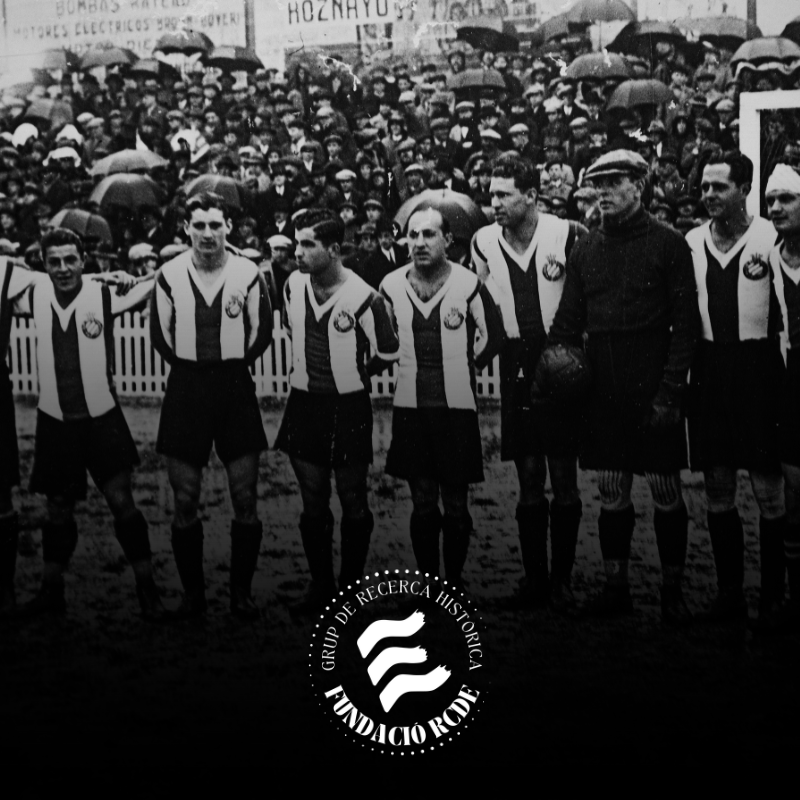From Paris 1924 to Paris 2024. 100 years of Olympians in Blue and Whites' colours
This May 2024 marks 100 years of Blue and Whites' participation in the Olympic Games, and as fate would have it, it was the same place where it all began, Paris, that hosted the Olympics. In this chronicle we would like to highlight those sportsmen and women who took part in the Games while belonging to the Club. We have footballers, a long-distance runner and a surprising tennis player.

Paris 1924: the beginning of everything
The Spanish football team arrived at the Olympic Games as one of the great favourites for the gold medal after the silver medal won in Antwerp in 1920. For this new adventure, the national team had two Espanyol players in its squad: the ‘divine’ Ricardo Zamora, back home since 1922, and José Luis Zabala from the Basque Country, one of the most determined strikers on the national scene. However, the Olympic team's run was short-lived, as they lost in the preliminary round against Italy (1-0). The match, played at the Stade Olympique de Colombes on 25 May 1922, was an evenly contested encounter that went the Italians' way. Zamora was a starter and one of the outstanding players. Zabala, on the other hand, did not play a single minute. The press at the time blamed the national team's lack of preparation for the Games for their early elimination.
Another player who played for Espanyol, Ricardo Saprissa, also defended the Spanish colours, but in tennis. Ricardo was a real Sportsman of the time, and also excelled in the sport of racquetball. Spanish doubles champion in 1923 and 1924, teaming up with Antonio Juanico, he was selected for the Games and played in the men's doubles with Eduard Flaquer and in the mixed doubles with Rosa Torras. His time in the tournament was also brief, as he was eliminated in the second round with Flaquer and in the first round with Torras.
London 1948: the flying Santboiano
The football team did not have any Blue and Whites' players in its squad, but there was another discipline in which a Espanyol player was present. With one of the most powerful sections of the time, the Espanyol athletics team had some of the biggest names on the national scene during the 1940s. Its star athlete, Sant Boi's Constantino Miranda, was part of the Olympic expedition at the London 1948 Games. Tino' participated in two middle-distance events, the 3,000m steeplechase and the 10,000m.
Memorable was his performance in the steeplechase championship, where he became the first finalist in the history of Spanish athletics at the Games, finishing in eighth position. A position that could have been even better, as he was kind enough to help an athlete in front of him to get up when he fell to the ground after overcoming the water pit. This gesture earned him the IOC Fair Play award.
Tino did not fare so well in the 10,000m, finishing 11th, although some mistakes in the laps of the lapped athletes caused confusion in the final rankings. Some media even speculated that Miranda might have finished seventh or eighth.
Mexico 1968: knocked out by the hosts
Migue Ángel Ochoa joined Espanyol in 1967 from Granollers. Despite playing very few minutes in the team during his first season, the young full-back from Extremadura was called up by coach José Emilio Santamaría to be part of the Spanish expedition to the Mexico Games, starting three of the four games played by the national team. After comfortably getting through the group stage, Spain lost 1-0 to hosts Mexico in the quarter-finals.
Curiously, the paths of Ochoa and Santamaría would come together again in 1972 when Ochoa joined Sarrià. With him on the bench, the Extremaduran would put in his best performances and take over the left flank of the team.
Moscow 1980: triple Perico participation
Espanyol was one of the clubs that contributed the most players to the Spanish Olympic team, with a total of three names: Ángel González, Manolo Zúñiga and Urbano Ortega. Of the Blue and Whites' trio, it was Ángel who managed to make a place for himself in Santamaría's eleven (now coach), being a permanent fixture in the line-ups. Urbano and Zúñiga played a more testimonial role, especially the latter, in a championship in which the national team had a disappointing performance. Despite a promising 1-1 draw against the German Democratic Republic, subsequent draws against inferior opponents such as Syria (0-0) and Algeria (1-1) left the Olympic team with no chance of reaching the quarter-finals.
Barcelona 1992: Sarrià, an Olympic protagonist
The designation of Barcelona as the host city for the 1992 Barcelona Olympic Games meant that Sarrià was once again at the epicentre of the world of sport after the 1982 World Cup, as it was chosen as one of the venues for the men's football tournament. Curiously enough, the Blue and Whites' stadium had to settle for the championship's first-phase matches in groups A, B and D, between 27 and 30 July, but not the knockout stages, which were reserved for La Romareda, Lluis Casanova and Camp Nou. As fate would have it, Italy returned to Perico's home ground, playing matches against Poland (3-0 defeat) and Kuwait (1-0 win). There were also matches between Sweden and Paraguay (0-0), Sweden and South Korea (1-1) and Mexico and Australia (1-1).
Atlanta 1996: failed expectations
The Spanish Olympic team, led by Javier Clemente, had one of the best young players in history, with names such as Raúl, Morientes, Mendieta and De la Peña. Espanyol brought their star player, home-grown player Jordi Lardín, who had completed a dream season with 21 goals to his name and was the favourite of the Sarrià crowd. However, the player from Esparraguera did not manage to establish himself in the starting eleven, being a revulsive player in second halves.
After a group stage where Spain had a solid result with two wins against Saudi Arabia (1-0) and Australia (3-2), and a draw against France (1-1), the always fearsome Argentina awaited in the quarter-finals. The match was a tale of two completely different halves. For the first 45 minutes, Javi Clemente's side played some of the best football seen at the Olympic tournament. However, in the last 45 minutes, they succumbed to the Argentinean gale and talent, with a 4-0 final score. The departure of Lardín and De la Peña in the second half was futile, as the team's fate remained unchanged, with the familiar curse of the quarter-finals once again making its presence felt.
Sydney 2000: a painful silver
With no time to celebrate the Copa del Rey won by Espanyol on 27 May, Raúl Tamudo (who left a recorded message for the fans celebrating the title in the Plaza de Sant Jaume) and Toni Velamazán left for the training camp of the Spanish U21 team, coached by Iñaki Sáez. This team would form the basis for the Sydney Games, held in September.
The Spanish national team, with another top-class generation that also included Perico home-grown player Capdevila, had a great tournament and reached the final. Both Velamazán and Tamudo played every game as starters and both managed to score a goal.
Their opponents for the gold medal were the surprising Cameroon, with names well known to the Espanyol fans, such as Kameni and Wome. The match of the indomitable lions took aggression to the limit, with our Espanyol players being the worst offenders, who left the field early due to injuries, Velamazán in the 27th minute and Tamudo in the 49th minute. The match ended in penalties, and the African team took the precious gold, with Kameni emerging as the national hero.
Beijing 2008: the first Perico gold medal
For the first time in its history, Espanyol contributed two players to foreign Olympic teams, and with a leading role: Milan Smiljanic for Serbia and Pablo Zabaleta for Argentina. Curiously, both were drawn in group A of the first phase, although they suffered very different fates.
While Lola's Serbia finished bottom of their group with just a single point, Zabaleta's Argentina, favourites to retain their gold medal after Athens 2004, had a perfect tournament, winning every match. Pablo, lord and master of the Albiceleste right wing, received the first gold (and so far the only one) in the history of a Perico player at the Games.
Tokyo 2021: double silver medal
Óscar Gil and Javi Puado's great season, which culminated in promotion to the First Division, was rewarded by coach Luis de la Fuente with an Olympic call-up for the Tokyo Games.
The role of both was uneven, as while the full-back took advantage of Mingueza's injury to establish himself in the eleven, the competition up front from men like Olmo, Oyarzábal, Asensio or Rafa Mir deprived Puado of more minutes in the team, being a starter in the group stage match against Australia (0-1 for Spain) and a revulsive player in the semi-finals against Japan (0-1).
The Olympic team, made up mostly of the current Euro champions, lost the gold medal in extra time against Brazil (2-1), but the silver medal was a magnificent epilogue for our Espanyol representatives.
Paris 2024: a new opportunity
For these Games, which start today, Espanyol will have two Olympic representatives, one in men's football and one in women's football.
In the Colombian team, Daniela Caracas has been a permanent fixture in the Colombian squad. Her great physique and quality have been a determining factor in the Women's team's promotion to the F League, and she is sure to be one of the mainstays of Colombia, who are in Group A of the group stage, along with France, Canada and New Zealand.
In the case of Joan Garcia, the parallels with Ricardo Zamora, the first Perico Olympian, are revealing. There is once again a Blue and Whites' goalkeeper one hundred years later with the national team and on the same stage, Paris. Both arrived at the Club at the age of 15, and were born in the first year of the century (1901 and 2001). Ricardo ended up being a legend.

